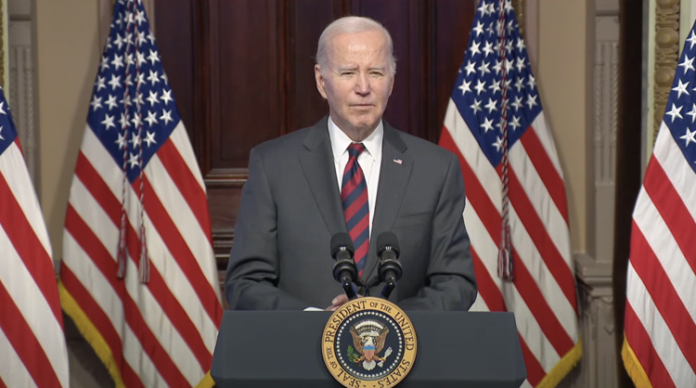By Casey Harper | The Center Square
President Joe Biden on Monday announced the creation of a new council in an attempt he said is to strengthen and protect American supply chains. The COVID-19 pandemic led to major disruptions of the U.S. supply chain, in part causing notable increases in prices that helped propel already rising inflation in recent years.
Inflation has since slowed, but Transportation Secretary Pete Buttigieg said the goal is to make the U.S. less vulnerable to those kinds of disruptions in the future.
“Our goal is to make our supply chains more durably resilient and to bring more of their elements home to American soil to prevent disruptions and price spikes in the future,” Buttigieg said.
The White House announced a series of actions, including the creation of the committee, to address the issue. That includes using the Defense Production Act to direct the production of more “essential medicines” in the U.S.
The White House also said the Department of Defense will issue a report on pharmaceutical supply chain resilience to help reduce “reliance on high-risk foreign suppliers.” The federal investment in domestic medicine production will start with $35 million from Health and Human Services.
“Before the pandemic, supply chains weren’t something that most Americans thought about or talked about,” Biden said. “But today after years of delay of parts and products, everyone knows why supply chains are so important.”
During his remarks Monday, Biden emphasized the need to bring more of the supply chain home and pointed to the Inflation Reduction Act and CHIPS and Science Act, which included tax credits for those investing in chip manufacturing in the U.S.
Currently, the U.S. manufactures a fraction of the global supply of microchips used in computers, cell phones, and more. Instead, the U.S. relies on production in Asia, notably China and Taiwan, further complicating China’s potentially imminent invasion of the island nation.
Biden claimed semiconductor manufacturers are investing hundreds of billions of dollars on new plants in the U.S.
“But these small computer chips the size of a fingertip, they affect nearly everything in our lives from cell phones to automobiles to refrigerators,” Biden said. “If you don’t have them, you don’t have those things. But over time, we went down from producing 40% of the world’s chips to just doing 10%. But not anymore.”
Another part of Biden’s effort involves broad coordination between government and private entities on where goods are being supplied and produced. The White House also pointed to hundreds of millions of dollars being invested by the Department of Energy, Department of Agriculture, and Department of Defense to encourage and strengthen local production.
The new council will also finish a quadrennial supply chain review” by the end of next year, an apparently holistic analysis of the U.S. supply chain and its weaknesses to be updated annually.
Much of the White House’s announcement pointed to the enactment of a provision in the infrastructure law, which passed with bipartisan support.
The plan also considers national security implications.
“DOD is increasing supply chain visibility through the creation of a Supply Chain Mapping Tool to analyze supplier data for 110 weapon systems,” the White House said in a statement. “This capability will be used to develop defense industrial base wargaming scenarios to identify vulnerabilities and develop mitigation strategies.”
The war in Ukraine, a major producer of wheat and fertilizer, has led to a global impact on the food supply chain. As always, Middle East oil suppliers also have outsized influence over U.S. energy costs.
“Our competition with China will be the defining issue of the next several decades,” Sen. Mark Warner, D-Va., wrote on X, formerly known as Twitter Monday. “We need to achieve and maintain a competitive edge in AI, the critical mineral supply chain, and more.”
Republished with the permission of The Center Square.














